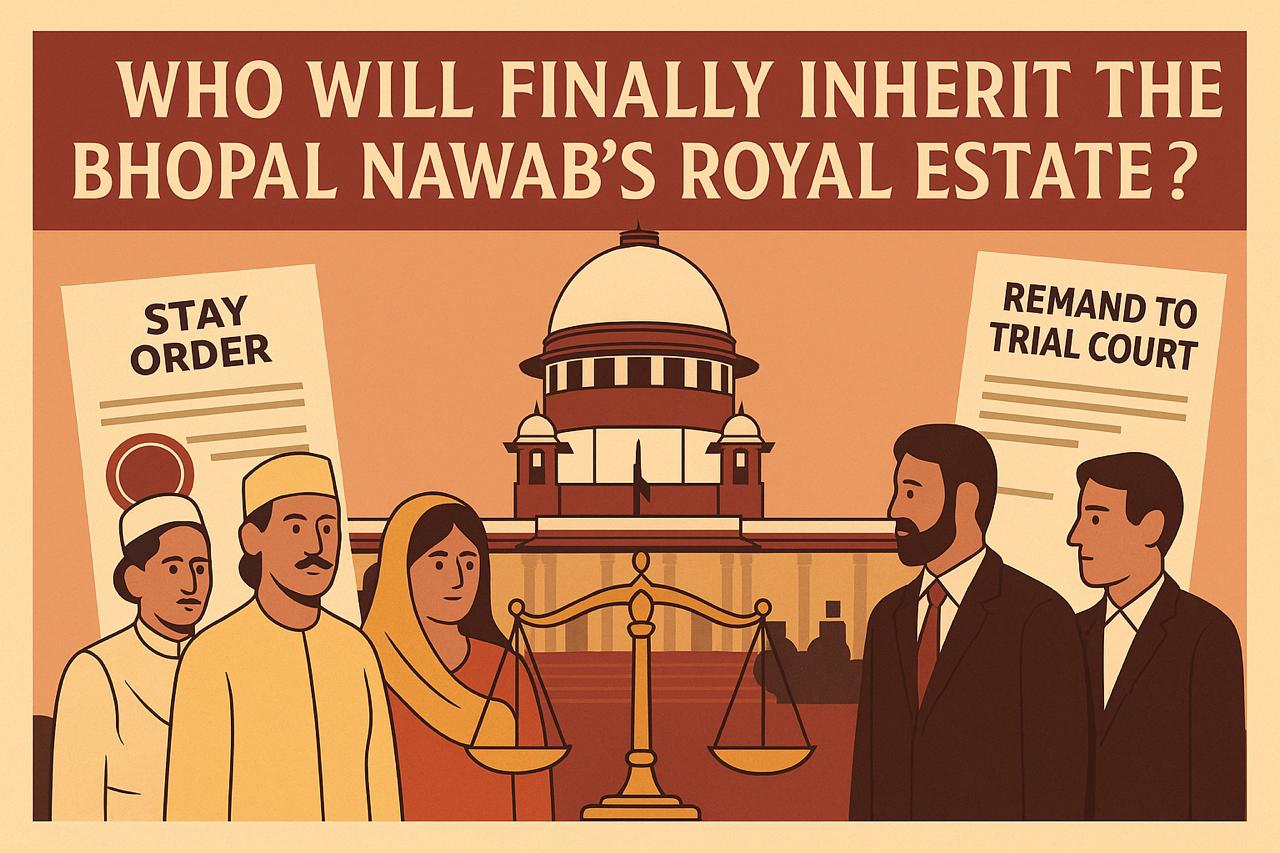Introduction: The Bhopal Nawab Estate Dispute Enters Supreme Court Spotlight
What happens when a royal inheritance battle refuses to die, dragging on for decades through India’s courts? The Bhopal Nawab estate dispute has been one such case, a blend of history, family rivalries, and intricate legal principles. On August 8, the Supreme Court stepped in, putting a temporary brake on a Madhya Pradesh High Court order that had sent the matter back to the trial court for a complete retrial. For the time being, the Supreme Court’s pause means Saif Ali Khan, his sisters, and his mother still hold their place as officially recognized heirs to Nawab Hamidullah Khan’s Bhopal estate. And it’s not only about the legal fine print. What’s unfolding is a glimpse into how echoes of royal history and long-standing family bonds still find their way into the messy, modern fights over who gets what.
Bhopal Nawab Estate Dispute: Supreme Court Stays MP High Court’s Remand Order
A bench of Justices P.S. Narasimha and Atul Chandurkar granted an interim stay while hearing a plea from Omar and Raashid Ali, descendants of the Nawab’s elder brother, who challenged the High Court’s June 30, 2025, decision. That order had overturned a 2000 trial court ruling that recognized Sajida Sultan (the Nawab’s daughter), her son Mansoor Ali Khan, and their heirs, including Saif Ali Khan, Soha Ali Khan, Saba Sultan, and Sharmila Tagore, as exclusive inheritors of the estate.
The High Court’s reasoning rested on the fact that the trial court had relied on a 1997 Allahabad High Court judgment later overruled by the Supreme Court in Talat Fatima Hasan v. Syed Murtaza Ali Khan (2019). Yet, instead of applying the correct law directly, the High Court opted for a complete remand, sending the case back to square one, something the petitioners now call a misuse of procedural powers.
Petitioners Challenge the Remand in the Bhopal Nawab Estate Dispute
Representing the petitioners, Senior Advocate Devadutt Kamat argued that the remand defied the scheme of Order XLI Rules 23 to 25 of the Civil Procedure Code. No side had asked for additional evidence, and the High Court had itself noted that the 2019 ruling favored the plaintiffs’ position. “If the law is settled in our favor, why should we have to start over after half a century of litigation?” Kamat pressed.
The Supreme Court seemed convinced that the issue warranted closer examination, issuing notices to the respondents and effectively freezing further trial court action for now.
Bhopal Nawab Estate Dispute: Royal Legacy Intersects with Constitutional Principles
The origins of the matter go back to 1960, when Nawab Hamidullah Khan passed away. In 1962, invoking Article 366(22) of the Constitution, the Government of India formally acknowledged Sajida Sultan as the Ruler of Bhopal. The trial court concluded that the Nawab’s personal estate did not fall under Muslim Personal Law and instead followed the princely rule of primogeniture, where the eldest child inherits the entire estate.
Dissenting relatives, including the Nawab’s daughter Qamar Taj Rabia Sultan and descendants of other siblings, argued that personal property should be divided equally among all heirs under Muslim Personal Law, a stance reinforced by the 2019 Talat Fatima Hasan judgment.
Primogeniture vs. Personal Law in the Bhopal Nawab Estate Dispute
The tug-of-war here isn’t just about family; it’s about two wildly different views of justice. On one side is tradition: the old rule that the eldest gets everything, the primogeniture system. On the other, India’s current personal laws call for a fair split among all heirs. Many legal observers argue the High Court could have made a decision, since the law on what should apply seemed straightforward, making a full retrial seem like an unnecessary detour.
Historical Parallels and the Bhopal Nawab Estate Dispute
Observers have likened this dispute to notable rulings such as Maharajadhiraja Madhav Rao v. Union of India (1971), which dealt with ending privy purses and royal entitlements. Sure, the two cases are different on the facts, but they both run into the same roadblock: what do we do when age-old royal customs don’t sit neatly inside the framework of the Constitution or today’s legal norms? It’s the kind of question that keeps popping up whenever history and law collide.
What’s Next in the Bhopal Nawab Estate Dispute
For the moment, the Supreme Court’s order has pressed pause on the trial court. Nothing more can move forward until the top court decides the next step. What happens next? The country’s top judges need to settle not just who owns the estate but also give clarity on what higher courts should do when the law seems already well-established so that future cases don’t get stuck in endless circles. Its decision could influence how similar cases where heritage and modern law collide are decided in the future.
Conclusion – The Bhopal Nawab Estate Dispute and the Quest for Legal Finality
This case is far more than a contest over inheritance; it is a generational legal narrative in which traditions of royalty confront the measured reasoning of constitutional justice. The Supreme Court’s stay is a pause, not an end, but it raises a larger question: how should courts balance respect for history with the need for timely, definitive justice? Whether this chapter finally closes or drags into yet another generation will depend on whether the nation’s highest court chooses finality over further delay. In the end, it’s not just about who inherits a palace; it’s about how India defines fairness when the past refuses to let go.
Author Information:
By Karthikeyan Ganesan, a law student from KKC College of Law, reporting on law and technology for Nyayasphere. Karthikeyan always likes to stay updated with current trends and important information regarding the law and cases across the country.

